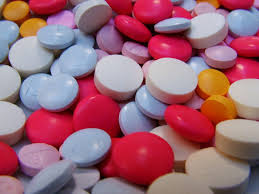Symptom Finder - Depression, Anxiety and Other Abnormal Psychic State
DEPRESSION, ANXIETY, AND OTHER
ABNORMAL PSYCHIC STATES
It is simple enough to administer a sedative and refer the emotionally distressed patient to a psychiatrist, but the astute diagnostician will want to rule out an organic disease first. Almost every endocrine disease is associated with emotional disturbances, all of which are potentially curable. In addition, electrolyte and other metabolic disturbances, chronic anoxia, or failure of any organ system may lead to anxiety, depression, or a psychotic state. The mnemonic VINDICATE will help to recall this important group of disorders.
V—Vascular diseases include myocardial infarction, CHF, cerebral arteriosclerosis, and thrombosis.
I—Inflammatory diseases recall syphilis, encephalitis, tuberculosis, brain abscess, influenza, pneumonia, and any prolonged infectious state, particularly that of the hospitalized patient with tubes in every orifice.
N—Neoplasms include cerebral tumors, tumors of the endocrine glands, and any neoplasm which is metastatic or which affects the metabolism of the body by a hormone or enzyme which it secretes. Pancreatic carcinoma is frequently associated with depression.
D—Degenerative diseases and deficiency diseases suggest presenile and senile dementia, pellagra, Wilson disease, and atrophy of the various endocrine glands.
I—Intoxication suggests lead poisoning, alcoholism, bromism, hypercalcemia, hypocalcemia, manganese toxicity, hypokalemia, hypovolemia, uremia, anoxia from pulmonary disease, anemia, heart disease, and corticosteroid therapy, as well as many other drugs. Porphyria may cause depression or a psychotic state.
C—Congenital suggests the depression associated with many congenital neurologic diseases: epilepsy, muscular dystrophy, Friedreich ataxia, myotonic dystrophy, and the depression associated with congenital heart disease and congenital defects of many organ systems.
A—Autoimmune diseases include MS and lupus erythematosus.
T—Traumatic disorders include the now well-recognized post traumatic neurosis or depression, neurocirculatory asthenia, and postconcussion syndrome. Compensation neurosis should be mentioned here. Sexual abuse is a common cause in children.
E—Endocrine diseases include hypopituitarism, acromegaly, hypothyroidism, apathetic hyperthyroidism, hypoparathyroidism, hyperparathyroidism, diabetes mellitus, insulinoma, hypogonadism, menopause, Cushing syndrome, and adrenal insufficiency. Depression, anxiety, and other abnormal psychic states.
Approach to the Diagnosis
If the patient is experiencing suicidal ideation, a referral to a psychiatrist is made immediately. The association of other symptoms and signs is all important. For example, anxiety, tremor, tachycardia, and diaphoresis may suggest alcohol withdrawal or hyperthyroidism. A triiodothyronine (T3) level, total thyroxine (T4) level, and free thyroxine index (FT4), urine for porphobilinogen, serum electrolytes, toxicology screen, lead level, 24-hour urine, 17-ketosteroid level, and 17-hydroxycorticosteroid level should be done on anyone suspected of having endogenous depression. (Possibly all depressed patients should get this screen.) Skull x-ray film, EEG, CT scan, and even a spinal tap (to rule out MS and lues) may be worthwhile when other neurologic signs are present.
ABNORMAL PSYCHIC STATES
It is simple enough to administer a sedative and refer the emotionally distressed patient to a psychiatrist, but the astute diagnostician will want to rule out an organic disease first. Almost every endocrine disease is associated with emotional disturbances, all of which are potentially curable. In addition, electrolyte and other metabolic disturbances, chronic anoxia, or failure of any organ system may lead to anxiety, depression, or a psychotic state. The mnemonic VINDICATE will help to recall this important group of disorders.
V—Vascular diseases include myocardial infarction, CHF, cerebral arteriosclerosis, and thrombosis.
I—Inflammatory diseases recall syphilis, encephalitis, tuberculosis, brain abscess, influenza, pneumonia, and any prolonged infectious state, particularly that of the hospitalized patient with tubes in every orifice.
N—Neoplasms include cerebral tumors, tumors of the endocrine glands, and any neoplasm which is metastatic or which affects the metabolism of the body by a hormone or enzyme which it secretes. Pancreatic carcinoma is frequently associated with depression.
D—Degenerative diseases and deficiency diseases suggest presenile and senile dementia, pellagra, Wilson disease, and atrophy of the various endocrine glands.
I—Intoxication suggests lead poisoning, alcoholism, bromism, hypercalcemia, hypocalcemia, manganese toxicity, hypokalemia, hypovolemia, uremia, anoxia from pulmonary disease, anemia, heart disease, and corticosteroid therapy, as well as many other drugs. Porphyria may cause depression or a psychotic state.
C—Congenital suggests the depression associated with many congenital neurologic diseases: epilepsy, muscular dystrophy, Friedreich ataxia, myotonic dystrophy, and the depression associated with congenital heart disease and congenital defects of many organ systems.
A—Autoimmune diseases include MS and lupus erythematosus.
T—Traumatic disorders include the now well-recognized post traumatic neurosis or depression, neurocirculatory asthenia, and postconcussion syndrome. Compensation neurosis should be mentioned here. Sexual abuse is a common cause in children.
E—Endocrine diseases include hypopituitarism, acromegaly, hypothyroidism, apathetic hyperthyroidism, hypoparathyroidism, hyperparathyroidism, diabetes mellitus, insulinoma, hypogonadism, menopause, Cushing syndrome, and adrenal insufficiency. Depression, anxiety, and other abnormal psychic states.
Approach to the Diagnosis
If the patient is experiencing suicidal ideation, a referral to a psychiatrist is made immediately. The association of other symptoms and signs is all important. For example, anxiety, tremor, tachycardia, and diaphoresis may suggest alcohol withdrawal or hyperthyroidism. A triiodothyronine (T3) level, total thyroxine (T4) level, and free thyroxine index (FT4), urine for porphobilinogen, serum electrolytes, toxicology screen, lead level, 24-hour urine, 17-ketosteroid level, and 17-hydroxycorticosteroid level should be done on anyone suspected of having endogenous depression. (Possibly all depressed patients should get this screen.) Skull x-ray film, EEG, CT scan, and even a spinal tap (to rule out MS and lues) may be worthwhile when other neurologic signs are present.

